Summary: Google ended up rolling out two major algorithm updates in February of 2014. The first, which seemed like the monthly Panda update, caused serious collateral damage with a number of prominent movie blogs. After hearing from one movie blog owner, Matt Cutts of Google got involved, and Google refined the algorithm. Two days later, Google Organic traffic surged back to the movie blogs, signaling that Google rolled out the algorithm update again. This post provides details, analysis, and findings based on analyzing movie blogs impacted by the UFeb14 and UFeb14Rev algorithm updates.
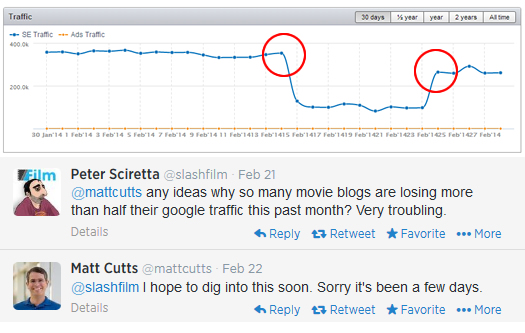
I’ve been following a fascinating SEO situation over the past ten days. And based on my analysis, I might have found something big. As in Panda big. So if you’re the type of person that’s interested in algorithm updates, or if you have been impacted by algo updates in the past, then this post is for you.
As I explained in my last post about the UJan14 update, Panda rolls out monthly, but Google won’t confirm those updates anymore. In addition, it could take ten days to fully roll out. That combination makes for a confusing situation for webmasters dealing with Panda attacks. But, SEOs neck deep in Panda work can often see those updates, as they are helping a number of companies recover, while they also have companies with fresh hits reach out to them.
Those SEOs can act as human barometers for Panda updates. And since I’m helping a number of companies deal with Panda hits, and I often have companies hit by algo updates reach out to me, I’m fortunate to have access to a lot of Panda data. And that data can often signal when Panda rolls out each month. In my last post, I documented the UJan14 update, based on seeing several companies recover and hearing from those on the flip side (the ones that got hit). Those websites unfortunately got hammered, typically by 25-40% – overnight.
At the end of that post, I mentioned that the February Panda update looked like it was rolling out (right around February 11, 2014). That made a lot of sense, since it was exactly one month from the previous Panda update. By the way, I am using the naming convention U{Month}{Year} to track unconfirmed updates by Google, so February’s update would be UFeb14.
Well, it seems I was right. After my post, I saw a number of companies impacted heavily by UFeb14, and most saw that impact beginning around February 11th through the 14th. Based on seeing those hits and recoveries in early February, it was already a big deal that Panda was rolling out. But little did I know what was coming… and it was big.
Peter Sciretta of SlashFilm Tweets and Matt Cutts Responds
On February 21, 2014, Peter Sciretta from SlashFilm tweeted the following to Matt Cutts:
@mattcutts any ideas why so many movie blogs are losing more than half their google traffic this past month? Very troubling.
— Peter Sciretta (@slashfilm) February 21, 2014
Boy, that got my attention for sure. I always look for common themes when analyzing Panda to see if any new factors have been added to the algo, if there was collateral damage, etc. As many in SEO know, Matt definitely responds to some people reaching out with messages, so I waited to see if he would respond. And he did, on February 22nd, Matt responded with the following tweet:
@slashfilm I hope to dig into this soon. Sorry it’s been a few days.
— Matt Cutts (@mattcutts) February 22, 2014
OK, so that response was very interesting. First, he hopes to dig into this soon… Really? Wow, so Matt is digging into an SEO situation based on a tweet? That was the first signal that Panda could have gone rogue. Second, he apologized for the delay in responding. Yes, another sign that Panda could have eaten some bad bamboo and went ballistic on sites that weren’t actually Panda targets.
So I ran to SEMRush and SearchMetrics to check out the damage. And there was damage all right… Serious damage. Check out the trending from SEMRush for SlashFilm:
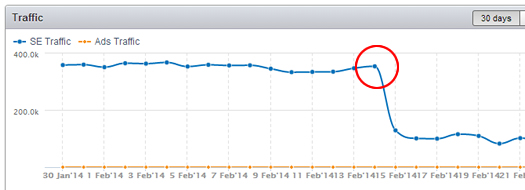
Which led me to check out other sites in that niche. And I found ScreenRant also had a huge drop.
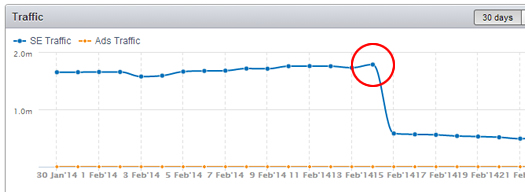
And they weren’t alone. A number of prominent movie blogs got absolutely crushed during UFeb14. Based on SEMRush data, the movie blogs I analyzed lost between 40% and 50% of their Google Organic traffic overnight. Boom.
U-Shaped Trending – The Blogs Bounce Back
What happened up to that point was already enough to have me heavily analyze the movie blogs, but the story was about to get better. Each morning following Matt’s tweet, I planned to quickly check the trending for the movie blogs I was monitoring to see if there were any signs of recovery. If Matt was checking on the situation, and if it was indeed a flaw in the algorithm, then Google could possibly roll out that algorithm update again.
The 23rd was quiet. No changes there. And then the 24th arrived, and what I saw blew me away. SlashFilm’s trending popped. Yes, it absolutely looked like they started to recover. Check it out below:

And ScreenRant showed the same exact jump. Wow, this was big. We just witnessed a flaw in the algo get rolled out, cause serious collateral damage, get re-analyzed, tweaked, and then rolled out again less than two days later. And then the movie blogs recover. I don’t know about you, but that’s the fastest Panda recovery in the history of Panda! :) Fascinating, to say the least.
So, I tweeted Barry Schwartz and Peter from SlashFilm about what I saw, and Peter did confirm they were seeing a big recovery. He also said the following, which I thought was interesting:
@glenngabe @rustybrick I heard it was just an error on google’s side
— Peter Sciretta (@slashfilm) February 25, 2014
And that’s some error… It’s a great example of how catastrophic major algorithm updates can be, especially when there’s a flaw in the algorithm that causes collateral damage. Losing 40-50% of your organic search traffic overnight could end some companies. And then there’s the most important question that Panda victims have been asking themselves since this happened. What if Peter didn’t complain to Matt Cutts? Would Google have picked up the problem on its own? How long would that have taken? And how much damage would those movie blogs would have experienced traffic-wise, business-wise, etc? All great questions, and only Google knows.
Digging Into the Panda Data
For those of you that are familiar with my work, my blogging, etc., you probably know what’s coming next. There’s no way in heck I would let this situation run by without heavily analyzing those movie blogs that experienced a serious drop in traffic. I had many questions. Why did they get hit? Were there any consistencies across the websites? What factors could have led to the flawed drop on 2/14/14? And what was the flaw in the algorithm that triggered Panda hits on the movie blogs?
So I started collecting data immediately, and I would refresh that data each day. That’s until I had time in my schedule to analyze the situation (which based on my chaotic schedule wasn’t until 5AM on Saturday morning). But I’ve now spent a lot of time going through data from movie blogs that got hammered on 2/14/14 and that recovered on 2/24/14. I’ve also dug into sites that only saw changes on one of those dates (to give me even more data to analyze).
I used SEMRush to uncover all of the keywords that dropped significantly in the rankings starting on February 14, 2014. I also was able to export the landing pages for each of the keywords. That was key, as Panda targets low-quality content. Analyzing that content could help me uncover problems that could have caused the Panda attack. I did this heavily for both SlashFilm and ScreenRant, as they both experienced a heavy drop on 2/14 and then a large recovery on 2/24. But I also analyzed other sites in that niche that experienced problems and recoveries during February. As I mentioned earlier, there were a number of movie websites impacted.
Analysis-wise, I heavily analyzed both sites manually and via crawls. The crawls were used to flag certain problems SEO-wise, which could lead me down new paths. My manual analysis was based on my extensive work with helping companies with Panda (knowing certain criteria that can cause Panda attacks). The combination of the two helped me identify some very interesting factors that could have led to the faulty Panda hits.
Here’s what I found… and stick with me. I’ll take you through some red flags before explaining what I think the actual cause was. Don’t jump to conclusions until you read all of the information.
1. Thin Content
It was hard to overlook the overwhelming amount of thin content I was coming across during my analysis. And when Panda targets low-quality content, which can often be extremely thin content, that had my attention for sure. For example, pages with simply an image, blog posts that were just a few sentences, etc.
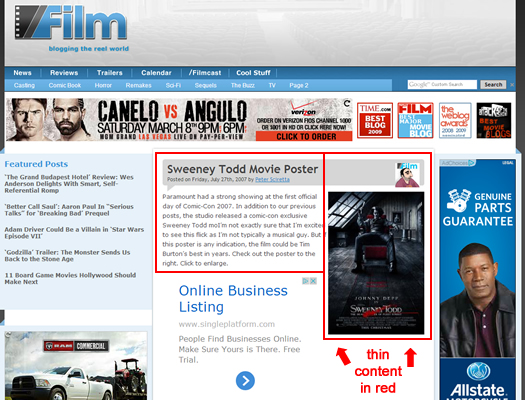
But, this was not a unique factor for February (or for just movie blogs), which is what I was looking for. Previous Panda updates could have absolutely crushed these blogs for thin content already… so why now? That led me to believe that thin content, although a big problem with the movie blogs I was analyzing, wasn’t the cause of the UFeb14 hit they took on 2/14/14. It met the “consistency” factor, since it was across the movie blogs, but wasn’t unique to this update. Let’s move on.
2. Affiliate Links
I’ve helped a number of companies with Panda that were engaged in affiliate marketing. Unfortunately, many affiliate marketers have gotten crushed since February of 2011 when Panda first rolled out. So, it was interesting to see what looked to be followed affiliate links to Amazon on a number of pages I analyzed. Those pages were thin, provided a quick mechanism to send along affiliate traffic to Amazon, and could absolutely get a website in trouble SEO-wise.
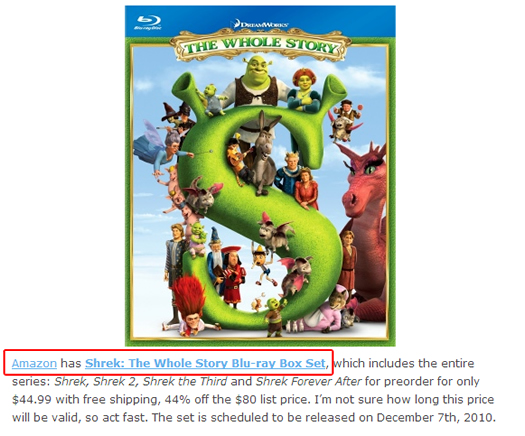
But two things stuck out… First, compared to overall indexation on the sites I was analyzing, the number of pages with affiliate links was low (at least for the affiliate links I picked up). Second, I did not find the same type of links across movie blogs that were hit. So, the “consistency” factor was not there. Time to move on (although I would caution the movie blogs that providing followed affiliate links violates Google Webmaster Guidelines).
3. Zergnet and Other Content Syndication Networks
Moving from inconsistency to consistency, I found a common thread across almost every movie blog I analyzed. I found Zergnet links at the bottom of each post. Zergnet is a content syndication network (similar to Outbrain, Zemanta, etc.) On the surface, and in their most current form, these networks shouldn’t impact SEO negatively. The links are nofollowed, which they should be.
But, in the past some of the networks were used to gain followed links from relevant websites across the web. And that violates Google Webmaster Guidelines. Actually, I’m helping several companies right now try to clean up followed links from older pages that still have followed links via Zemanta. Here’s what the Zergnet links look like on the movie blogs:

But, like I explained above, the current implementation of Zergnet links is fine right now. All of the links are nofollowed, which should shield the sites from any Google damage. Let’s move on.
4. Videos, Trailers, and Copyright Infringement – Bingo
When the movie blogs got hit, a number of people in SEO (including myself) started making the connection between YouTube, copyright infringement, and the algo hits. As movie blogs, one could only imagine that there were a lot of posts about movies that contain video clips, trailers, etc. So, I was interested in seeing how much video footage I would come across during my analysis, and how much of that was problematic copyright infringement-wise.
And since we live in an embeddable world (with YouTube and other video networks making it easy to embed video clips on your own website), questions started to arise about how Google could treat the various parties involved in copyright infringement. In other words, who is the source of copyright infringement? And how can you police others SEO-wise that might be part of the problem? What about websites that simply embed public YouTube clips? All good questions, and I was eager to dig in.
It wasn’t long before I came across webpages with video clips that had copyright infringement problems. Now, those clips were typically sourced at YouTube or other video networks like Yahoo Video. The great part about YouTube clips that were taken down is that they will literally provide a message in the clip that the user associated with the account has been removed due to copyright problems. That made my analysis easier, to say the least.
So, trailer by trailer, video clip by video clip, I came across more and more examples of videos and users removed due to copyright infringement. Here are some screenshots based on my research. Notice the copyright infringement messages on pages that got hammered during the UFeb14 algorithm update:
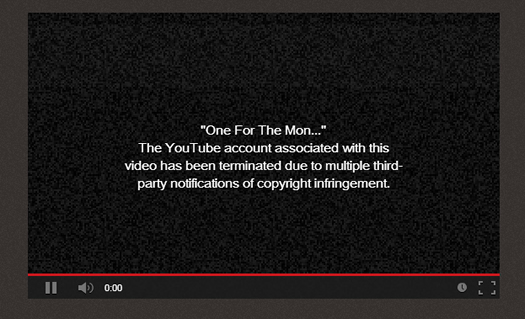
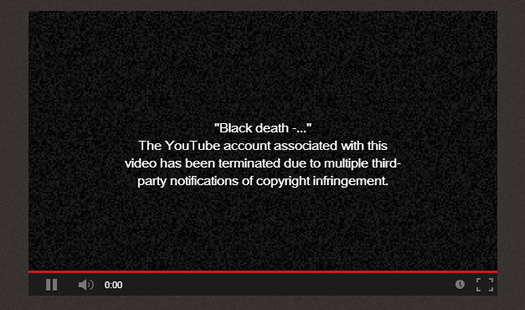
And ladies and gentlemen, this is where I think the flawed algo incorrectly targeted the movie blogs. SlashFilm, ScreenRant, and others weren’t the source of copyright infringement. They were simply end users that embedded those clips in their own posts. So, if YouTube originally let the clips reside on its own network, and freely let users embed those clips on their own sites, could Google actually penalize those destination websites?
That wouldn’t be right… The penalty should simply be a bad user experience for visitors of the blogs, since the clips won’t play. Now, if the movie blogs were creating their own videos that violated copyright laws, then I get it. But shouldn’t that damage come via the Pirate Update? I heavily analyzed the Pirate Algorithm recently, and you can read more about my findings by following that link.
So, it was interesting to see copyright-driven factors severely impact websites during what seemed to be the monthly Panda update. Is Google incorporating more Pirate factors into Panda? Are we seeing the maturation of Pirate into a rolling monthly update like Panda? Was this the first time Google tried to incorporate Pirate into the monthly update? All good questions.
Back to Video & More Embed Problems…
Visit after visit, page after page, I came across all types of video embed problems on the movie blogs. For example, I saw copyright notices, blank videos (like the videos were removed from the services being used), embed code actually on the page versus the videos, messages that a video was now marked as private, etc. All of this could very well be tied to copyright infringement.
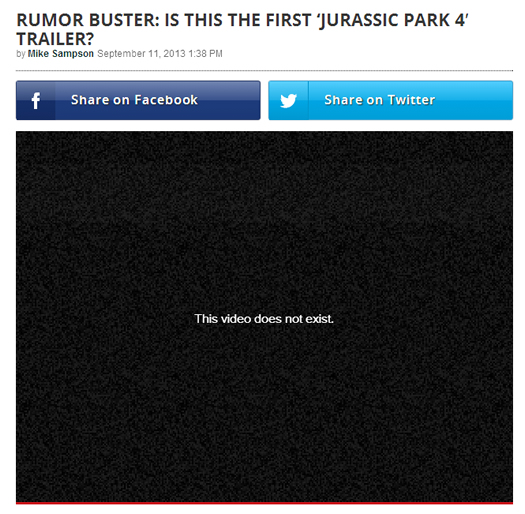
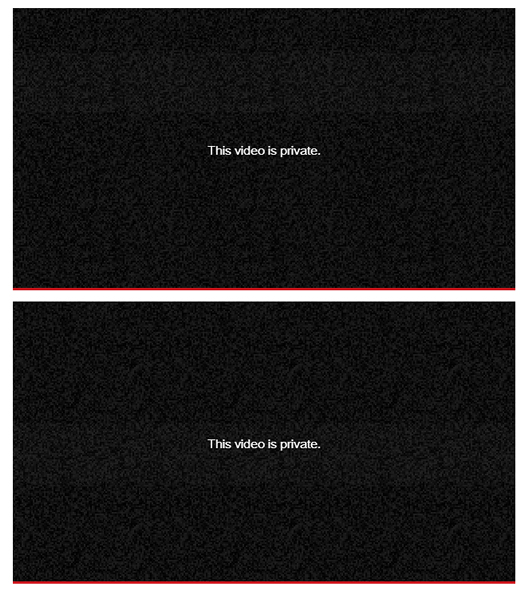
CinemaBlend and Recovery During UFeb14Rev
And the plot thickens… The examples listed earlier were based on analyzing sites that experienced a major hit on 2/14 and then recovered on 2/24. But what about other movie sites during that timeframe? Did any experience unusual declines or surges? Yes, they did. I started checking many sites in the movie blog niche, and one in particular caught my attention. Check out the trending for CinemaBlend.com:

Wow, they experienced a huge surge in traffic once UFeb14Rev rolled out (the revised algorithm update that rolled out once Matt Cutts got involved). It looks like they originally got hit in January (I’m assuming by UJan14). Connecting the dots, if CinemaBlend recovered during the revised February update, then could they have been wrongly impacted in January? Why would they recover during UFeb14Rev and not just UFeb14? Yes, I had to dig in. Down the rabbit hole I went… And yes, this was becoming my own version of Inception. One SEO rabbit hole led to another rabbit hole. Maybe I should create a movie trailer about it and embed it here. :)
I began digging into the data, based on CinemaBlend’s recovery and was eager to see if video clips, trailers, and copyright infringement would surface. But what I found was really interesting… The pages looked clean… but almost too clean. There were pages optimized for trailers, when in fact, there were no videos embedded on the page. At least now. The more pages I checked, the stranger that situation became… Many trailer pages either contained blank spots where videos once resided, or the pages just contained no videos at all. Very strange.
So it begs the question, did CinemaBlend quickly deal with their Panda hit from January? Did they analyze their landing pages seeing a drop and remove dead video clips, videos that were flagged for copyright infringement, etc? I can’t say for sure, but the crime scene looked too pristine to me.
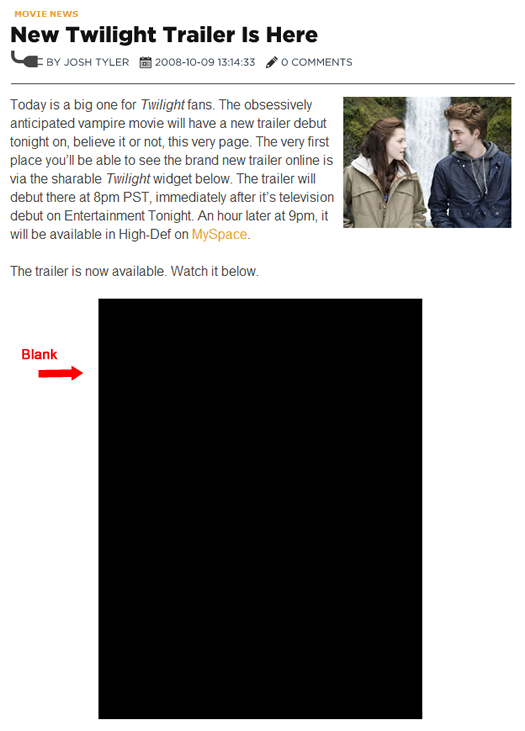
What This Means For SEOs, Panda Victims, Movie Sites, and Google
Based on what happened during February, there are some important points I wanted to list. If you are dealing with a Panda situation, if you are susceptible to Panda, if you are an SEO helping others with Panda, or if your business simply relies on Google Organic traffic, then the bullets below should be of extreme importance to you.
- Google Does Make Mistakes
And when those mistakes are tied to major algorithm updates, collateral damage could occur (in grand ways). Based on what happened with the movie blogs, I think all of the website owners owe Peter Sciretta a drink (or a bonus). Without Peter speaking up, it’s hard to say how long that ugly situation would have gone on. Instead, it was only ten days. - Know What You Post (and the source of that information)
As more and more algorithm updates are being crafted in Google labs, and subsequently injected into the real-time algorithm, it’s more important than ever to know your site inside and out. Know what you are posting, where it’s from, if it’s original, if you are breaking any copyright laws, if it’s scraped, etc. If you don’t, you are leaving yourself susceptible to future Panda and Pirate attacks. Talk about a shot across your bow. :) Be vigilant. - Unconfirmed Updates Create Madness in Webmasters
I called this when it was first announced, but Panda updates without confirmation can be disastrous for webmasters. It’s hard enough for SEOs neck deep in Panda work to decipher what’s going on, but it’s exponentially harder for people outside of SEO to know what happened. It’s one of the reasons I’ve been writing more and more about Panda updates. I want to make sure we document major algo updates that seem to be Panda (roll out once per month, target low-quality content, etc.) Without some form of identification, we’ll be living in a quasi, post-apocalyptic web. Queue another trailer, this time with Matt Cutts standing in for Mad Max. :) - Track and Document Everything You Can (And Speak Up)
It’s more important than ever to analyze your website, your analytics reporting, Google Webmaster Tools data, etc. Use annotations in Google Analytics to mark dips and surges in traffic, add information about confirmed and unconfirmed algorithm updates, export your data regularly, and monitor the competition. If you end up in a situation like the movie blogs, you’ll have a lot of data to analyze, to hand SEOs that are helping you, and even to provide Google if it comes to that.
A Quick Note About UFeb14 and UFeb14Rev
I know a number of people have reached out to me since UFeb14 rolled out on 2/11/14 asking for more details. I focused this post on the movie blog situation, based on how unique and fascinating it was. But, I do plan to write more about the latest Panda update (so stay tuned). As I said earlier, it’s important to document as many algorithm updates as we can so webmasters impacted by those updates can have some idea what hit them, what the root causes of their problems are, etc.
Summary – Flawed Algorithms, Movie Blogs, and Collateral Damage
Based on my experience with Panda, the past ten days have been fascinating to analyze. Needless to say, you don’t often see algorithm updates roll out, only to get refined days later before a second rollout. But that’s exactly what we saw here with UFeb14 and UFeb14Rev. On the one hand, it was great to see Google move quickly to rectify a flaw in the UFeb14 algorithm update. But on the other hand, it makes you wonder how many other flaws are out there, and how many sites have been wrongly impacted by those flaws.
For Peter Sciretta, and his fellow movie bloggers, they dodged a serious bullet. Actually, it was a magic bullet. One that first passed right through their hearts, pulled a 180, headed back to Google, was taken apart and refined, and then shot back out across the web. But how many other flawed bullets have been shot? Wait, it sounds like a great storyline for a new movie. Maybe Peter can connect me with some movie producers. :)
GG

Glenn,
I think you did an excellent job of analysis across enough of a range of potential issues to have nailed at least a significant portion of the problem these sites faced.
I’m going to dig around the myriad of sites I’ve got access to and see what I can find (if I can find the time in between client audits)…
Thanks Alan. It was fascinating to analyze the movie blogs. One SEO rabbit hole led down another… I don’t know what was more intriguing, the copyright infringement issue or the possibility that Pirate could be going monthly (along with Panda). Needless to say, this situation has far-reaching consequences. :)
And it would be great if you could look around too. Let me know what you find! Thanks again.
Interesting analysis. Could it be related to this post – http://googlewebmastercentral.blogspot.com/2014/01/affiliate-programs-and-added-value.html? Perhaps whatever update was related to this warning didn’t start until February, around the dates you outlined.
Great question, and could be the reason some other categories got hit hard during the UFeb14 updates. And by the way, a number of those sites did not bounce back on 2/24.
But, the movie websites I analyzed didn’t really fit into that category. As I mentioned in my post, I definitely picked up some affiliate content, but it wasn’t overwhelming. Also, the problematic videos were not tied with affiliate content. And last, affiliate content wasn’t consistently found across movie blog websites I analyzed. So, I’m not sure that would be the case (since the entire niche got hammered).
But, I’ve had other companies (from other categories) reach out to me about the UFeb14 updates. I still need to dig in there… I’ll try and post an update if anything interesting comes out of my analysis.
It seemed to me that the Webmaster Central post actually supports your observations. I think the affiliate angle is just an obvious example of how content can become widely reproduced. The larger point is republishing or syndicating video content that is widely available without adding value results in thin pages and a frustrating user experience. Since many affiliates don’t add value, affiliate programs become an obvious source of thin pages. That doesn’t rule out sites that syndicate or scrape content that wasn’t part of an affiliate program. It just might be the case that a number of pages on the sites you analyzed fit the same profile as pages from sites that republished a lot of affiliate program content.
Is it really a flaw though? In my view broken videos give a terrible user experience because you’re promising something without delivering it.
That’s a great point Stefan. Bad user experience absolutely can get you hammered from a Panda standpoint. But this was different. The entire niche got taken down, and Panda would probably have hammered that factor in the past (the user experience factor).
I think it was tied more to the copyright infringement issue. And that’s especially the case as more companies in other niche areas have reached out to me with similar hits during the UFeb updates. Very good point, though. :)
Hey Glenn,
Nice analysis & I agree with your Panda data refresh timings from our experiences.
I will write a full post on this soon, but we experienced an interesting issue with a small local client during the first Panda update in Jan, which corrected itself from around the 21st of Jan. It felt like Google messed up the first update & rolled it back a little or let some slip out. (Certainly not all, as we know others who still have an issue).
In the Feb update, the same small client got nailed again. We then experienced a full recovery again on the 27th (a few days later than you suggested).
Now this client is a small insurance broker. They don’t have any duplicate content on their own website. They don’t have thin pages. They don’t have affiliate or copyright stuff etc. They are not a usual Panda suspect ;-)
However, we spotted their web designer had accidently let their test site (which sat in the designers own sub folder on their domain) get indexed. So there was a completely duplicate version of their site indexed, which although the designer didn’t link to, was disovered by Google via a Wordpress RSS / ping etc.
Anyway, this was enough to kill the clients website completely. In terms of *reputation*, the designers site is about on par with the clients site. The clients site was however indexed first obviously and the designer had originally blocked the sub folder by robots.txt, but accidently removed it over time.
So, Google’s duplicate content filters are playing an aggressive role in the Panda refreshes and they get it wrong, a lot. Innocent small businesses can get completely nuked, through no fault or control of their own.
Oh & we did a removal request on the 26th and the clients site bounced back on the 27th. Lucky timing with a roll back? Or did the removal do the job? I believed the latter, but hard to say.
Little screenshot – http://i.imgur.com/l1i2OV8.jpg
Cheers.
Dan
Thanks for your comment Dan, and that’s a heck of a story! Very interesting to see the trending (especially the drop on 2/14 and subsequent recovery on 2/27). Those ups and downs closely match what happened with the movie blogs, although it sounds like a much different scenario.
Just wondering, does that website use any embedded video clips? More and more companies are reaching out to me after reading my post and finding problematic video embeds. I see that your client’s site was also impacted during UJan14, so I’m not sure it’s the same problem (but I wanted to check).
Regardless, it’s great you picked up the duplicate pages and rectified the problem. Definitely let me know if you see any more changes as more updates roll out. We’re nearing the time for another Panda update. Brace yourself. :)
Their site has two video embeds, which are their own videos explaining insurance (exciting) & they work fine, without any copyright issues etc in this case.
Let’s see what happens next week anyway… ;-)
Zemanta “related article” links are editorial because it is an editors choice to link to you. That opinion is shared by Google as that is where that statement came from. They are also not all nofollowed as you suggest.
That’s way too broad of a statement Mark. I’ve had a number of companies explain to me that SEO and “linkbuilding” were exactly why they used Zemanta (and other content syndication networks). They could care less about the traffic…. it was for the links (and rich anchor text links at that).
I’m not saying all Zemanta links are bad. It’s on a situation by situation basis. And the clients I’m helping have a serious problem with archived links that are followed. And those are clearly unnatural links.
They are not unnatural, they are editorial. Zemanta does not involve paying for links, you are merely buying advertising to a specific demographic of bloggers, it is their choice to link to you. I don’t think my statement is broad at all. Someone from Google said specifically that these are considered editorial links because of the reasons I stated above. Not a link scheme and not against their webmaster guidelines.
Mark, links don’t have to be paid for to be unnatural. I’ve completed a boatload of Penguin work since April of 2012, and many links are free, yet unnatural.
And again, I’ve had *a number of companies* explain to me that’s exactly what they were doing… using Zemanta and other content syndication networks for links. That’s completely the wrong approach to building links.
It sounds like you (or your company) have used Zemanta heavily for linkbuilding. Care to share some sites that have used that approach heavily? I’d love to check them out.
We use it like filler when it comes to link building, they’re not great links in my opinion, but they are from relevant blog content and have a few other good things going for them.
We use these at the moment for clients where there is a lack of other scalable/repeatable/reliable link building methods that we can employ, lack of any other ways to build links without ridiculous efforts, obviously needs a blog in place – also prefer they have a diversified backlink profile beforehand so that these are just a drop in the bucket.
I don’t work with any sites that have more than 10-15 zemanta links so there is not much to learn from there for you. If you have interest you can email me at admin@arpogo.com and Im happy to share a bit more detail.
… but if you ask me, a real editorial link is always natural.
That’s really interesting read Glenn, I am glad I’ve had the chance to read your thoughts, thanks for sharing!
I might read too much into it but this CinemaBlend scenario reminds me of an opportunity way too well seized. I recall that the 10 day penalty that Rap Genius “suffered” by Google brought it the publicity that it could hardly hope for otherwise.
Thanks Nevyana. I’m glad you found my post interesting. Analyzing the two updates was fascinating. Regarding CinemaBlend, they recovered during UFeb14Rev, and not during UFeb14. It seems like they cleaned up the site after UJan14 (when it looks like they were impacted). I’m glad Peter from SlashFilm spoke up… if not, it’s hard to say how long the entire niche would have been impacted.
I was searching on the web, trying for the last time to find a cause for this exact problem (movie site, more than 50% drop in ranks, website no long on the first page of google search…) that has been going on on my movie website since january. I was almost completely happy when i started reading this post, thinking i found the answer, but as you say it, it should be ok at this point and increasing ranks? in any case, i’m going to check the embed videos, to see if it would work. Great post and research.
Wow, glad you found my post Laura. If you want to email me the domain, I can quickly check it out. Thanks.
Thanks for answering so fast. Its a brazilian movie website. We started to erase our embed videos last night. Last week we had an increase of 400% on wednesday and thought things were about to get better. But it has gottten worse. http://www.zonacritica.com.br . We are running out of options and thinking about ending all the hard work
I dont know if you actually had the chance to take a look at our situation, so i came back for an update anyways. Since the last time i came here we’ve had ups and downs on our website. More downs than ups. But this present week we’ve been having 4 good days (i think) in a row, for the first time since january. Besides removing our SEO plugin and the embed videos, we didnt change anything. I have high hopes that this means the bad times are going away, but the last time we had a rise in our rankings, two weeks ago, we disappeared the same as before. Let’s see how it goes. ^^
Great analysis, but your conclusion was wrong. It was just an error on Google’s part which was corrected when someone returned from vacation (no, I’m not making that up). But who would ever guess THAT was the problem as opposed to something all the site shared in common.
Hey, thanks for your comment Vic. I wish you would have stopped by in February though! I know a number of movie blogs have come back based on the tweak to the algo, but I’m not sure all have. I’d have to go back through the sites to see which ones did.
But this underscores a very important point. Collateral damage can easily happen when you’re dealing with algorithms. Your niche got hammered in February and if Peter didn’t speak up, all the sites could have remained that low. That’s alarming for sure.
Regarding what triggered the hit, that’s still debatable. I do think it was related to the videos with copyright issues. I saw that problem across a number of sites that got hammered. It could have been that the algo was hitting the wrong element in the chain (the sites embedding the clips vs. the source of the clips). Hard to say.
BTW, you weren’t the only the niche to get hit around that timeframe. Lyrics websites got hammered in April. More info here -> http://www.hmtweb.com/marketing-blog/april-2014-google-algorithm-updates-song-lyrics/
Many have still not come back. I’ll be covering that situation in greater detail soon. :)
Google again playing catch 22 and picking winners. What ever happened to good content sites ranking well? Now only large players(Movie site$) get Matt Cutts ear.
Can’t wait for the class action lawsuit to hit when the truth finally comes out.